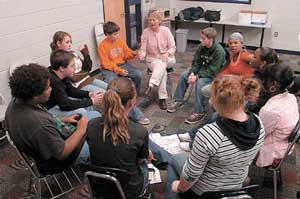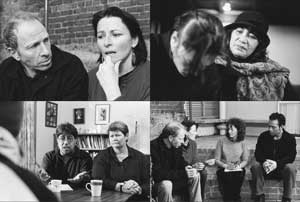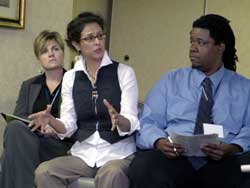News & Announcements
- Details
- Written by Abbey J. Porter
As an increasing number of schools worldwide adopt restorative practices as a means of dealing with discipline and improving school culture, school leaders are beginning to analyze the impact of restorative methods. The numbers tell a powerful story: Schools implementing restorative methods have seen a drop in disciplinary problems, decreased reliance on detention and suspension, and an improvement in student attitudes. Gathering such data is important, both for evaluating the effectiveness of restorative methods and garnering funding support for restorative programs.
(Instead of zero tolerance and authoritarian punishment, restorative practices provides high levels of both control and support to encourage appropriate behavior, and places responsibility on students themselves, using a collaborative response to wrongdoing. The philosophy underlying these practices holds that human beings are happier, more productive, and more likely to make positive changes in their behavior when those in positions of authority do things WITH them, rather than TO them or FOR them.)
So far, much significant research on restorative practices in schools has consisted of qualitative studies. (See Part 1 of this article.) “We’ve shown in case study after case study that schools that adopt this approach report significant changes in their cultures,” said Dr. Paul McCold, researcher and founding faculty member of the International Institute for Restorative Practices (IIRP) graduate school. “What’s needed now is solid quantitative research.” Both quantitative and qualitative analyses are valuable, he noted, as qualitative studies can help to explain quantitative findings.
- Details
- Written by Joshua Wachtel
Dr. Lawrence W. Sherman and Dr. Heather Strang, both longtime researchers on the effectiveness of restorative justice (RJ), have recently published a major new study titled “Restorative Justice: The Evidence.” Published in the UK, carried out by the Jerry Lee Center of Criminology at the University of Pennsylvania, Philadelphia, and sponsored by the Smith Institute, an independent think tank based in London, the study concludes that RJ—no matter how it is measured—is as or more effective than traditional methods of criminal justice (CJ) for reducing crime with respect to nearly every group of offender studied.
“There is far more evidence on RJ, with more positive results, than there has been for most innovations in criminal justice.”
—From “Restorative Justice: The Evidence”
- Details
- Written by IIRP
BBC Radio has posted a "Lent Talk" by prominent UK barrister Cherie Booth,QC (Queen''s Counsel), about the themes of restorative justice in thestory of Zacchaeus. (Booth is married to UK Prime Minister Tony Blair.)She also tells several contemporary restorative justice stories. Hertalk is an eloquent expression of the essence of restorative justice.Available on the web as text or audio.
- Details
- Written by Abbey J. Porter
Learn about the IIRP SaferSanerSchools™ program.
 Debbie Little, restorative practices coordinator, South Lyon, Michigan, Community Schools, conducts a circle at Centennial Middle School. Hal Gould, South Lyon HeraldEducators around the globe are using restorative practices to proactively prevent problems like bullying and violence. Research shows that restorative approaches can transform student behavior and build healthy school communities. Part I of this two-part article looks at what educators and trainers say about the benefits and strategies of implementing restorative methods. Part II will provide quantitative analyses illustrating the impact of restorative practices in schools.
Debbie Little, restorative practices coordinator, South Lyon, Michigan, Community Schools, conducts a circle at Centennial Middle School. Hal Gould, South Lyon HeraldEducators around the globe are using restorative practices to proactively prevent problems like bullying and violence. Research shows that restorative approaches can transform student behavior and build healthy school communities. Part I of this two-part article looks at what educators and trainers say about the benefits and strategies of implementing restorative methods. Part II will provide quantitative analyses illustrating the impact of restorative practices in schools.Growing awareness that punishments such as detention and suspension only aggravate issues such as bullying, violence, poor academic performance and parental apathy has prompted educators to explore restorative practices to create safe, supportive learning environments.
Restorative practices promotes inclusiveness, relationship-building and problem-solving, through such restorative methods as circles for teaching and conflict resolution to conferences that bring victims, offenders and their supporters together to address wrongdoing. Instead of punishment, students are encouraged to reflect on and take responsibility for their actions and come up with plans to repair harm.
RJ in the Land of the Long White Cloud: New Zealand Embraces Restorative Justice for Adult Offenders
- Details
- Written by Joshua Wachtel
 Dramatizations of conferences from a film made by the New Zealand Ministry of Justice in 2001 to train facilitators for the Courts PilotWhile it would be an exaggeration to say that restorative justice (RJ) has completely overtaken conventional forms of justice in New Zealand, RJ has made as much headway on the island nation as it has anywhere in the world. RJ processes—mainly conferencing, based on practices adopted from the Maori people of New Zealand, in which offenders, victims and their supporters meet face to face to repair the harm caused by crimes—are being implemented in the country of 4.1 million throughout the criminal justice system.
Dramatizations of conferences from a film made by the New Zealand Ministry of Justice in 2001 to train facilitators for the Courts PilotWhile it would be an exaggeration to say that restorative justice (RJ) has completely overtaken conventional forms of justice in New Zealand, RJ has made as much headway on the island nation as it has anywhere in the world. RJ processes—mainly conferencing, based on practices adopted from the Maori people of New Zealand, in which offenders, victims and their supporters meet face to face to repair the harm caused by crimes—are being implemented in the country of 4.1 million throughout the criminal justice system.Unlike a court trial, where lawyers argue the law and impartial justice is meted out by juries and judges, conferencing puts those most affected by crime at the heart of the process. Victims, who are often unable to face or speak to offenders in court, are given a chance to express how they feel and have a say in the outcome.
- Details
- Written by Zvi Gabbay
This article by Zvi D. Gabbay, analyzes the premises of the main theories of punishment that influence sentencing policies in Western countries and compares them to the basic values of restorative justice. Originally published by the Journal of Dispute Resolution, a publication of the Center for Dispute Resolution of the University of Missouri School of Law.
- Details
- Written by Joshua Wachtel
 The Experts Group meets to discuss the United Nations Handbook of Restorative Justice Programmes, in Vienna, Austria, January 2006.Restorative practices got a boost last month with the publication of the Handbook on Restorative Justice Programmes by the United Nations Office of Drugs and Crime’s Criminal Justice Reform Unit (UNODC CJRU). The Handbook, a free publication, serves as an introduction to the theory and practice of restorative justice. A hard copy is available from UNODC RJRU (This email address is being protected from spambots. You need JavaScript enabled to view it.) or online in PDF eBook format.
The Experts Group meets to discuss the United Nations Handbook of Restorative Justice Programmes, in Vienna, Austria, January 2006.Restorative practices got a boost last month with the publication of the Handbook on Restorative Justice Programmes by the United Nations Office of Drugs and Crime’s Criminal Justice Reform Unit (UNODC CJRU). The Handbook, a free publication, serves as an introduction to the theory and practice of restorative justice. A hard copy is available from UNODC RJRU (This email address is being protected from spambots. You need JavaScript enabled to view it.) or online in PDF eBook format.“We felt we needed to offer a tool,” said Ricarda Amberg, officer-in-charge of the CJRU. “[This is] resource material that gives a snapshot view of what restorative justice is all about.”
According to the UNODC CJRU’s webpage, “Criminal justice reform is at the heart of the mandate of the United Nations” (http://www.unodc.org/). The Handbook is the latest in a series of efforts by the UN and the CJRU to encourage nations to develop alternatives to imprisonment and make restorative practices a component of their criminal justice policy.
- Details
- Written by Laura Mirsky
Can restorative justice conferencing be valuable in cases of serious offenses — crimes like murder, sexual abuse and arson? A restorative justice conference is a structured meeting between offenders, victims and their supporters in which they deal with the consequences of a crime and decide how best to repair the harm. Can victims of serious crimes benefit from a process where they face the people who have caused the crime? Can this process also have a positive impact on individuals who have committed such crimes?
What we do know is that almost everyone who participates in a restorative justice conference — victims, offenders, their family members and friends — has a favorable reaction to the process. They are satisfied and they feel a sense of fairness. Relationships are improved and a sense of community is achieved. In fact, many victims experience dramatic positive outcomes that they do not seem to be able to achieve any other way.
In a composite analysis of research from Australia, Canada, the UK and the US, Dr. Paul McCold, at the International Institute for Restorative Practices, found that victims and offenders almost universally have positive responses to restorative justice. Also, recent research published in a dissertation by Dr. Caroline Angel showed that restorative justice reduces the incidence of post-traumatic stress symptoms in victims (see article here).
- Details
- Written by IIRP
View papers from the 8th International Conference on Conferencing held October 18-20, 2006, in Bethlehem, Pennsylvania, USA.
- Details
- Written by Laura Mirsky
 A lively discussion at “Down Country Roads, from Small Towns to Inner Cities: Restorative Justice in Illinois–See How it Works,” presented by Sally Wolf, Karen Lambert, Edith Crigler, Gary Balgemann, Elizabeth Vastine, Robert Spicer, D. Marie Goff, Donald Goff and Patricia Zamora. Photo by Thomas Kosa
A lively discussion at “Down Country Roads, from Small Towns to Inner Cities: Restorative Justice in Illinois–See How it Works,” presented by Sally Wolf, Karen Lambert, Edith Crigler, Gary Balgemann, Elizabeth Vastine, Robert Spicer, D. Marie Goff, Donald Goff and Patricia Zamora. Photo by Thomas KosaThe eighth International Conference on Conferencing, Circles and other Restorative Practices, "The Next Step, Developing Restorative Communities, Part 2," was a big success, according to participant feedback. The conference was held in the IIRP’s hometown of Bethlehem, Pennsylvania, USA, on October 18-20, 2006. More than 300 people joined in the three-day event, from Australia, Belgium, eight provinces of Canada, Costa Rica, England, Hungary, Ireland, Israel, the Netherlands, New Zealand, Northern Ireland, Norway, Scotland, South Africa, Sweden, Taiwan and 25 states of the USA, plus Washington, D.C. and Guam.
In the plenary sessions alone, four nations were represented: England, Scotland, Israel and the USA. More information on the conference, including the schedule, papers and participant comments are available here: http://www.iirp.edu/beth06/index.html.
As is always true at IIRP conferences, a feeling of community quickly developed among participants. Although most had never met before, attendees found that they had plenty to talk about regarding their restorative work, doing things with young people and adults, not to them or for them.
The enthusiasm for learning and sharing was palpable in and out of the official presentations. Many "breakout sessions" spilled into overtime as people compared notes on the nitty gritty of their restorative work. To cite one instance, the session: "Communities Within Communities: A Partnership Between a School-Based and Court-Based Restorative Program," led by Virginia Wiley of the Bluewater School District in Ontario, Canada, became a discussion about the issues session participants were facing implementing restorative programs in their own communities.

Restorative Works Year in Review 2024 (PDF)
All our donors are acknowledged annually in Restorative Works.
